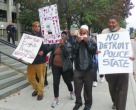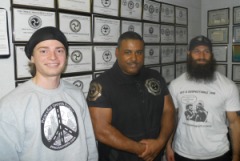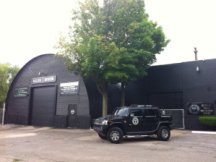 On Sunday morning, a black Tahoe with IDEAS ARE BULLETPROOF and NO MASTERS NO SLAVES emblazoned on its sides, and COPBLOCK.ORG on its rear cruised out of Keene, New Hampshire, headed for the Motor City in Michigan. Piloting the truck, I was scheduled to pick up Pete Eyre from the airport that evening after the day’s ride West. Detroit is the sixth of nine cities being visited on the in-progress 2013 Police Accountability Tour. Pete and fellow videographer Jacob Crawford began the tour in Austin, Texas, at the Police Accountability Summit hosted by the Peaceful Streets Project. The tour continued in New York City before going global with an extended stop in Cape Town, South Africa. Returning to Jacob’s home town of Oakland, California, Pete continued solo on to Denver, Colorado before reaching our present location in Detroit.
On Sunday morning, a black Tahoe with IDEAS ARE BULLETPROOF and NO MASTERS NO SLAVES emblazoned on its sides, and COPBLOCK.ORG on its rear cruised out of Keene, New Hampshire, headed for the Motor City in Michigan. Piloting the truck, I was scheduled to pick up Pete Eyre from the airport that evening after the day’s ride West. Detroit is the sixth of nine cities being visited on the in-progress 2013 Police Accountability Tour. Pete and fellow videographer Jacob Crawford began the tour in Austin, Texas, at the Police Accountability Summit hosted by the Peaceful Streets Project. The tour continued in New York City before going global with an extended stop in Cape Town, South Africa. Returning to Jacob’s home town of Oakland, California, Pete continued solo on to Denver, Colorado before reaching our present location in Detroit.
Each city has its own unique issues with monopolist police services. Detroit is known for having a historically overzealous police force, which has been the subject of so many internal investigations that the US Department of Justice was tasked to oversee reformation efforts in the early aughts. Even with state and federal oversight of government mismanagement, the city is still plagued with some of the most violent neighborhoods in the nation, where many police officers refuse to patrol and 911 response times are disturbingly long, not uncommonly taking upwards of an hour.
While the state’s solutions to these crimes have consistently failed and even exacerbated the problem, the folks of Detroit have some assistance on the ground documenting the  issues and challenging police brutality in legal land. The local publication Voice of Detroit, edited by Diane Bukowski, chronicles much of the police abuse and unaccountability in recent years. The investigative journalism featured at VoD is both revealing and shocking, covering high-profile police abuse cases such as the killing of seven year old Aiyana Jones, and the troubling pasts of the city police chief and his highest ranking colleagues.
issues and challenging police brutality in legal land. The local publication Voice of Detroit, edited by Diane Bukowski, chronicles much of the police abuse and unaccountability in recent years. The investigative journalism featured at VoD is both revealing and shocking, covering high-profile police abuse cases such as the killing of seven year old Aiyana Jones, and the troubling pasts of the city police chief and his highest ranking colleagues.
 Also working to assist the people against police violence is the Detroit Coalition Against Police Brutality, first organized in October of 1996. While also sharing content through a radio program and blog, the DCAPB’s 10-point mission statement demonstrates their commitment to solving problems that do not self-correct or are even acknowledged by the above-the-law enforcers. Pete reached out to the organizers from DCAPB and we plan on meeting up with them during the remainder of our stay here to learn more. Here are some admirable excerpts from their mission statement:
Also working to assist the people against police violence is the Detroit Coalition Against Police Brutality, first organized in October of 1996. While also sharing content through a radio program and blog, the DCAPB’s 10-point mission statement demonstrates their commitment to solving problems that do not self-correct or are even acknowledged by the above-the-law enforcers. Pete reached out to the organizers from DCAPB and we plan on meeting up with them during the remainder of our stay here to learn more. Here are some admirable excerpts from their mission statement:
4. We demand that the City of Detroit require the Detroit Police Department to file an annual report of citizens’ complaints against the Department, and that reports of all citizen complaints be available to the public. This report should be comprehensive and include the following: a) complaints filed by intermediaries or witnesses to police brutality, b) fatalities at the hands of police officers, and c) the disposition of all cases of citizen complaints – summarized and compiled in a single document that is available to the public. Citizens who file a complaint should be kept informed of the progress in their investigation. The outcome of all investigations should immediately be made public. The monthly tabulation of crime in the city should be made available to the citizens of Detroit through the libraries and the Department’s web-site.
5. We demand that the City of Detroit require accountability from the Detroit Police Department in the application for, receipt of, and allocation of funds from the State and Federal governments, and that such funds not be used in discriminatory ways, and that no funded programs violate human and Constitutional rights of Detroit citizens…
6. We demand that the City of Detroit facilitate community-based conflict resolution and mediation initiatives. The Detroit Coalition Against Police Brutality is developing a “Peace Zones for Life Program” that will address this cause. Our plan will include methods that will allow the citizens’ options to submit their grievances for resolution by their neighbors or persons whom they trust; thereby, remaining outside the police/criminal justice system and eliminating conflict within our communities.
The DCAPB lists many accomplishments since its twelve year existence, including assisting in the exoneration of unjustly convicted individuals incarcerated by the state’s misdirected criminal justice system. They also played a role in initiating the federal government’s investigation into corruption and abuse in the city’s police force, as well as successfully blocking the issuance of tazers, often used as pain compliance devices, to any of the departments uniformed officers.
 On the agenda for myself, Pete, and others interested in proliferating police accountability last evening was a visit to the Threat Management Center, a security service provider whose employees are committed to the safety of all people in their neighborhoods. On a previous expedition to visit their office earlier in the year, Pete produced an iconoclastic video of his interview with service’s founder. Established by Dale Brown in 1994, the Threat Management Center’s toll-free number has replaced 9-1-1 for many in Detroit. The private service provides faster response times and a commitment to nonviolent conflict resolution that goes above and beyond the detached, self-interested standards of city police, who are trained to value their own lives first above those of others in the community. The Threat Management Center takes the opposite approach, with all of their employees following a strict code of conduct and utilizing the best modern technology to hold themselves and others accountable at all times. Though they carry a variety of defensive tools, employees only openly display their carry of non-lethal tools, concealing any firearms, and the organization is gearing up to move in the direction of carrying zero lethal weapons by the start of the new year. Regarding the use of firearms, employees are only permitted to draw a firearm if they confirm the presence of a firearm on an aggressor, and are prohibited from ever being the first to fire a shot.
On the agenda for myself, Pete, and others interested in proliferating police accountability last evening was a visit to the Threat Management Center, a security service provider whose employees are committed to the safety of all people in their neighborhoods. On a previous expedition to visit their office earlier in the year, Pete produced an iconoclastic video of his interview with service’s founder. Established by Dale Brown in 1994, the Threat Management Center’s toll-free number has replaced 9-1-1 for many in Detroit. The private service provides faster response times and a commitment to nonviolent conflict resolution that goes above and beyond the detached, self-interested standards of city police, who are trained to value their own lives first above those of others in the community. The Threat Management Center takes the opposite approach, with all of their employees following a strict code of conduct and utilizing the best modern technology to hold themselves and others accountable at all times. Though they carry a variety of defensive tools, employees only openly display their carry of non-lethal tools, concealing any firearms, and the organization is gearing up to move in the direction of carrying zero lethal weapons by the start of the new year. Regarding the use of firearms, employees are only permitted to draw a firearm if they confirm the presence of a firearm on an aggressor, and are prohibited from ever being the first to fire a shot.
While the Threat Management Center has many paying clients to whom they provide defense instruction, bodyguard protection, as well as regular neighborhood patrols, their services are not only afforded to those with the capital to cover the costs of the well-equipped security. Because of their professionalism and commitment to nonviolence, and using the absolute minimal amount of force necessary to deescalate situations, the Threat Management Center is able to foster community connections that the untrustworthy police cannot, and in doing so they are creating a model for all stateless,  community safety projects to emulate. The Center also offers complimentary classes for law enforcement officers, which often uncomfortably challenges the reactionary tendencies trained into law enforcers.
community safety projects to emulate. The Center also offers complimentary classes for law enforcement officers, which often uncomfortably challenges the reactionary tendencies trained into law enforcers.
Embedded below is a playlist of videos from our inspirational three hour conversation with Dale, where he lays out the guiding principles that led him to found the Threat Management Center and his goals to see the model spread to every town and city where people require safety services not being provided by monopolist institutions.


